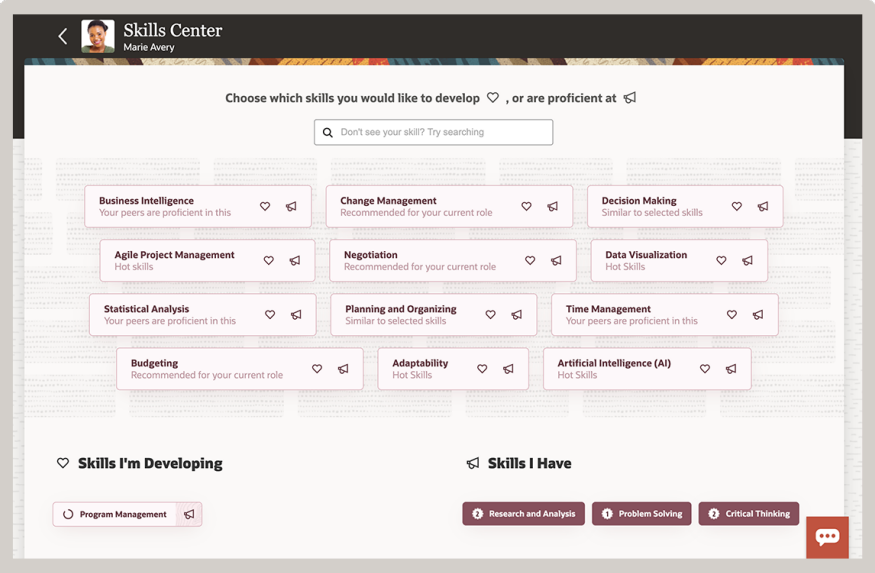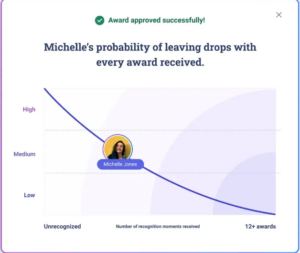Event Report from Oracle CloudWorld 2024 – Enabling Skills-Based Talent Management
October 22, 2024
In September, the H3 HR Advisors team attended Oracle CloudWorld 2024 –the tech company’s massive user conference and technology showcase, which was held in Las Vegas. This year’s iteration of CloudWorld included several new HCM product announcements, updates on Oracle HCM’s overall growth and progress, and key customer success stories highlighting the impact of HR technology on business and HR transformation. While there were numerous HCM suite product updates and enhancements announced at CloudWorld, there were two significant product announcements we’d like to recap and analyze here on H3 HR Insights – the release of Artificial Intelligence tools in the form of a collection of new AI Agents, and an important update to Oracle Dynamic Skills capabilities.
In Part Two of our CloudWorld 2024 event report, we will examine the updates to Oracle Dynamic Skills, how Oracle Cloud HCM can help organizations define, assign, develop, and analyze employee skills, and how this approach can support organizations that are moving towards a skills-centered approach to talent management and development.
A New Approach to Skills Management
Over the last several years, a significant focus in HR technology innovation has been the development of solutions to help organizations understand, manage, and develop employee skills. From the HR technology provider community to major human capital management consulting organizations to numerous writers, speakers, and thought leaders, the conversations around skills have likely never been more prevalent. Major organizations are attempting to re-imagine many talent management processes, like recruiting, training, career planning, workforce planning, etc., to make them “skills-centric.” Often, these initiatives correspond to eliminating or de-emphasizing formal degrees and other traditional qualifications used in the candidate evaluation process. I would say that other than Generative AI, probably the most prevalent topic in HR tech in the last few years has been skills and what, where, when, and how they should be managed in the HR technology stack.
Skills data and management capabilities are now offered in various applications in an organization’s typical HR technology platform – in the Applicant Tracking System, Learning Management Systems, Talent Intelligence platforms (a newer HR tech), and core HR systems. It can be extremely challenging for HR and HRIT leaders, particularly in larger organizations, to best determine where in the HR tech stack skills should be managed, and that is really just the start of the journey to skills-based talent processes. Skills are not becoming so important to many organizations that having skills-related data housed in multiple, potentially siloed systems will likely create a significant barrier to the eventual successful transition to skills-centric talent management.
Oracle’s Dynamic Skills Capability
At CloudWorld, Oracle announced its updated approach to helping organizations manage skills more effectively and efficiently with its updated Oracle Dynamic Skills application. Oracle Dynamic Skills helps organizations—regardless of where they are on their skills journey—better understand, develop, and utilize the skills of their employees, expand access to opportunity to more individuals, and make smarter people and workforce decisions.
Dynamic Skills allows organizations to manage their skills data centrally, import skills information from external systems as needed, leverage a pre-defined library of over 10,000 skills, and have skills data available throughout the talent management processes that would benefit from using skills data. Key capabilities of Oracle Dynamic Skills include:
An AI-powered skills inventory – Helping organizations to create a complete catalog of their organization’s skills that can be modified or refined and is always kept up to date.
Pre-populated skills library – Enables HR leaders to rapidly start their skills journey with an extensive pre-populated skills library to augment existing skills data or serve as a starting point.
Skills data analysis – Empowers HR leaders with tools to analyze their workforce’s skills strengths, gaps, and trends with flexible and easy-to-use business intelligence tools.
Skills curation and management – Enables HR leaders to browse, add, and modify skills with intuitive tools to further refine and personalize their skills library.
During CloudWorld, Oracle leaders emphasized the importance of having skills libraries, definitions, and skills management be a central part of the organizations’ HR system of record, and not dispersed in different HR applications like for recruiting or career planning. By centralizing skills management and developing an open architecture that allows for the addition and augmenting of skills data from other sources, Oracle aims to help organizations better manage and leverage skills in all the HR processes and functions that are moving towards a skills-based focus.
Conclusion
In the last few years, and certainly still in the last part of 2024, AI technology and skills technology have been the two most important areas of innovation and development in HR tech. With two major announcements at CloudWorld, which we have covered here on H3 HR Insights, Oracle has made it clear that it understands the criticality of both trends and is committed to pushing the envelope on innovation and impact for its customers. In many ways, Oracle has moved ahead of the market with its announcements and new innovations, and it will be interesting to see how the market reacts.
You can learn more about how Oracle Cloud HCM is helping organizations modernize their HR practices on these recent HR Happy Hour podcasts:
Transforming Healthcare with Innovative HR Technology – Guest: Elina Petrillo, VP, Head of HR Technology at Northwell Health
The “Quest” to Revolutionize HR Tech – Guest: Hubert Winter, Senior Director at Quest Diagnostics
How we can help
Led by Trish Steed and Steve Boese, H3 HR Advisors harnesses over 40 years of experience to delivery HCM insights and guidance to global organizations.
H3 HR Advisory services
By leveraging technology, analytics, and our deep industry knowledge we can help you to reposition your workforce and ensure that you have the right people with the right capabilities in the right roles to positively impact the growth of your business.
HR Happy Hour Podcast Network
Created in 2009, The HR Happy Hour Show is hosted by Steve Boese and Trish Steed and is the longest continuously running internet radio show and podcast on Human Resources, HR Technology, Talent Practices, Workplace and Leadership topics.
H3 HR Speaking Services
We work closely with every client to customize your content - keynotes, webinars, research, infographics, and buyer’s guides - to inspire, educate and inform the audience enabling you to reset and realign your organization for a talent-led breakthrough.
Get in touch
Talk to us today and find out how we can help you and your organization leverage HCM technology to attract, onboard, retain and manage top talent.




